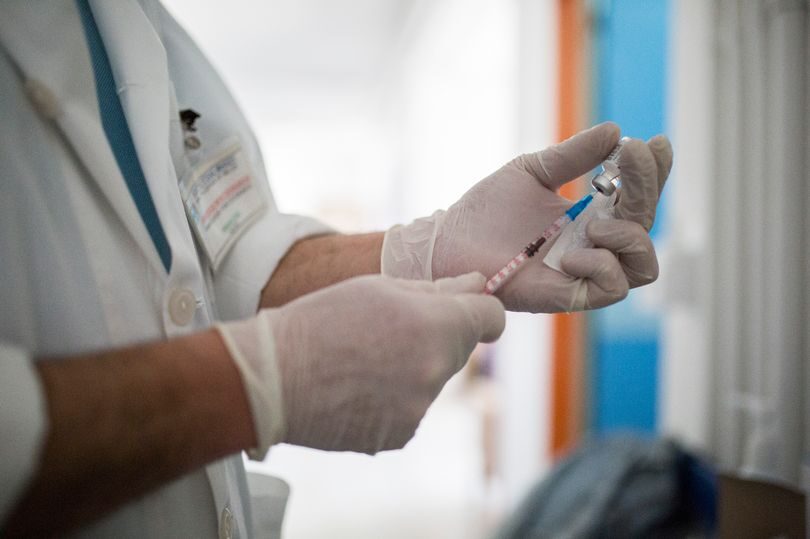
Kort sagt tyder officielle britiske regeringsdata kraftigt på, at den Covid-19-vaccinerede befolkning er ved at udvikle en ny form for Covid-19-vaccine-induceret erhvervet immundefektsyndrom.
Det britiske sundhedssikkerhedsagentur (UKHSA) udgiver en ugentlig vaccineovervågningsrapport, hvor hver rapport indeholder fire ugers data om Covid-19-tilfælde, hospitalsindlæggelser og dødsfald efter vaccinationsstatus. Til vores undersøgelse analyserede vi 5 af disse offentliggjorte vaccineovervågningsrapporter indeholdende data fra 16. august 2021 til 2. januar 2022, for at få et klart billede af, hvilken effekt Covid-19-vaccinerne har på den vaccinerede befolknings immunsystemer, og det er hvad vi fandt...
Kommentar: Delvist oversat af Sott.net fra Official data suggests the Triple Vaccinated may be developing Acquired Immunodeficiency Syndrome at an alarming rate
The UKHSA Vaccine Surveillance Reports used for our investigation can all be found here -
- 'Covid-19 Vaccine Surveillance Report - Week 37' (Published by PHE)
- 'Covid-19 Vaccine Surveillance Report - Week 41' (Published by UKHSA)
- 'Covid-19 Vaccine Surveillance Report - Week 45' (Published by UKHSA)
- 'Covid-19 Vaccine Surveillance Report - Week 49' (Published by UKHSA)
- 'Covid-19 Vaccine Surveillance Report - Week 1 - 2022' (Published by UKHSA)
Pfizer claim that their Covid-19 mRNA injection has a vaccine effectiveness of 95%. They were able to claim this because of a simple calculation (full details of which can be viewed here) performed on the number of infections confirmed amongst the vaccinated group and the not-vaccinated group during the earliest stages of the still ongoing clinical trials.
Now, thanks to a wealth of data published by the UK Health Security Agency we are able to use the same calculation that was used to calculate 95% effectiveness of the Pfizer vaccine, to calculate the real world effectiveness of the Covid-19 vaccines, and the data unfortunately paints an extremely concerning picture.
The week 37 Vaccine Surveillance report included the number of Covid-19 cases by vaccination status between week 33 and week 36 of 2021 (August 16th to September 12th). Because the report tells us the Covid-19 case rates per 100,000 people among the unvaccinated and two dose vaccinated population we are able to calculate the real-world vaccine effectiveness during this period, and it proved to be as follows -
The real-world effectiveness of all available Covid-19 vaccines combined was as low as minus-47% in the 60-69 age group, and as high as +66% in the under 18 age group between August 16th and September 12th 2021. The only other age groups that the vaccine was showing to have positive effect at this point were 18-29, 30-39, and 80+. But as you can clearly see none of the age groups were showing a vaccine effectiveness anywhere near 95%.
However, just look at how the tables turn just one month later.
The week 41 Vaccine Surveillance report included the number of Covid-19 cases by vaccination status between week 37 and week 40 of 2021 (September 13th to October 10th), and the real-world vaccine effectiveness during this period was proving to be as follows -
The real-world effectiveness of all available Covid-19 vaccines combined was as low as minus-109% in the 40-49 age group, and as high as +89% in the under 18 age group between September 13th and October 10th 2021. The only other age group that the vaccine was showing to have positive effect at this point was 18-29.
What's concerning here though is how far the real-world effectiveness of the vaccine has fallen in all age groups, but especially the 40-49 age group which fell from a real world of effectiveness of minus-36% to minus-109%.
The fact that the real-world effectiveness of the vaccines had surpassed the minus-100% barrier in suggested that not only were the vaccines failing, but they were also completely decimating the immune system of the recipients.
This makes the next Vaccine Surveillance report frightening reading.
The week 45 Vaccine Surveillance report included the number of Covid-19 cases by vaccination status between week 41 and week 44 of 2021 (October 11th to November 7th), and the real-world vaccine effectiveness during this period was proving to be as follows - -
The real-world effectiveness of all available Covid-19 vaccines combined was as low as minus-126% in the 40-49 age group, and as high as +78% in the under 18 age group between October 11th to November 7th 2021. The only other age group that the vaccine was showing to have positive effect at this point was again 18-29.
What's concerning here is that two more age-groups have surpassed the minus-100% barrier, with the 50-59 age group falling to minus-116% and the 60-69 age group falling to minus-120%. But what is perhaps more concerning is that the effectiveness of the Covid-19 injections has continued to decline in the 40-49 age group after already surpassing the minus-100% barrier in the previous month.
What we can also see from the above is that the effectiveness of the Covid-19 injection in persons over the age of 80 has climbed from minus-22% to minus-9 percent. This coincides with the booster jab roll-out to this age group, suggesting the vaccines do in fact boost the immune system.. But it is worth noting that there is still a negative effectiveness in this age group, and it still lower than the minus-3% effectiveness seen between week 33 and week 36 of 2021.
The week 49 Vaccine Surveillance report however, provides a much clearer picture on the effect of the boosters on the vaccinated population in the short term.
The week 49 Vaccine Surveillance report included the number of Covid-19 cases by vaccination status between week 45 and week 48 of 2021 (November 8th to December 5th), and the and the real-world vaccine effectiveness during this period was proving to be as follows -
The real-world effectiveness of all available Covid-19 vaccines combined was as low as minus-120% in the 40-49 age group, and as high as +80% in the under 18 age group between November 8th to December 5th 2021. The real-world effectiveness of the Covid-19 injections actually only decreased in the 18-29-year-olds and 30-39-year-olds during these four weeks.
People over the age of 70 were rewarded with a major boost to their immune systems over these four weeks, with vaccine effectiveness proving to be +27% in 70-79-year-olds between 8th Nov and 5th Dec 21, compared to minus-84% between 11th Oct and 7th Nov 21.
Whilst vaccine effectiveness in people over the age of 80 increased to +47% between 8th Nov and 5th Dec 21, compared to minus-9% between 11th Oct and 7th Nov 21.
Everyone between the age of 40 and 69 was also rewarded with a boost to their immune system during this period, however not enough to show a positive vaccine effectiveness. This boost in vaccine effectiveness coincides with when the booster shots were administered to each age group as can be seen in the below graph taken from the UKHSA Vaccine Surveillance Report - Week 1 - 2022.
Based on vaccine effectiveness turning positive in everyone over the age of 70 following the booster shot after previously showing a negative effectiveness, we should expect to see a much improved vaccine effectiveness in 40-69-year-olds in the next published Vaccine Surveillance Report.
But unfortunately this isn't the case.
The week 1 - 2022- Vaccine Surveillance report included the number of Covid-19 cases by vaccination status between week 49 and week 52 of 2021 (December 6th to January 2nd), and the and the real-world vaccine effectiveness during this period proved to be as follows -
Real-world vaccine effectiveness dropped to the lowest levels yet across all age groups except for the over 70's between December 6th and January 2nd, but the over 70's still dropped into negative effectiveness.
The expected further boost to 40 to 69-year-olds did not materialise and instead a huge tumble in vaccine effectiveness was recorded, dropping to -151% in 40-49-yer-olds.
Vaccine effectiveness also tumbled in the 30-39-year-old age group to minus-123%, despite the booster jab being administered to millions in week 49.
The following graph illustrates the increase/decrease in vaccine effectiveness by the month among each age group over a period of 5 months from 16th Aug 21 to 2nd Jan 22.
The first booster shots were administered in week 37 of 2021, and this graph illustrates clearly how they provided a boost in vaccine effectiveness in the following two months. But unfortunately it also shows how short lived this boost was with the effectiveness of the Covid-19 vaccines falling to frightening levels between week 49 and 52.
But what does a positive / negative vaccine effectiveness actually mean?
Vaccines work by simulating a viral attack and provoking the immune system into responding as if you have had the virus. They are supposed to train the immune system to the point where you develop natural immunity to the virus. Therefore, vaccine effectiveness is really a measure of the immune system performance induced by the vaccine.
A vaccine effectiveness of +50% would mean that the fully vaccinated are 50% more protected against Covid-19 than the unvaccinated. In other words the fully vaccinated have an immune system that is 50% better at tackling Covid-19.
A vaccine effectiveness of 0% would mean that the fully vaccinated are 0% more protected against Covid-19 than the unvaccinated, meaning the vaccines are ineffective. In other words the fully vaccinated have an immune system that is equal to that of the unvaccinated at tackling Covid-19.
Whilst a vaccine effectiveness of -50% would mean that the unvaccinated were 50% more protected against Covid-19 than the fully vaccinated, meaning the vaccines actually decimate the immune system.
Therefore with the real-world effectiveness of the Covid-19 vaccines proving to be negative in everyone over the age of 18 in England, this means double/triple vaccinated adults immune systems are being decimated.
Immune System Performance
The formula used to calculate the real-world effectiveness of the Covid-19 vaccines was based on the exact calculation used by Pfizer to demonstrate that their vaccine had an alleged effectiveness of 95%.
- U = No. of Cases among the unvaccinated
- V = No. of Cases among the fully vaccinated
- U - V / U = Vaccine Effectiveness
Therefore, the calculation for a positive immune system performance is -
U - V / U
Whilst the calculation for a negative immune system performance is -
U - V / V
The following table shows the monthly boost/decline in the immune systems of the vaccinated population compared to the natural immune systems of the unvaccinated population-
This shows that as of the 2nd January 2021 (Month 5), triple/double vaccinated 40-49-year-olds currently have the worst immune system performance at -60%. But they are closely followed by 30-39-year-olds at -58%, 18-29-year-olds and 50-59-year-olds at -55%, and 60-69-year-olds at -47%.
The following graph illustrates the overall immune system performance among all age groups in England over the past 5 months -
What we can see from the above is that the immune system performance for adults aged between 18 and 59 has deteriorated to the worst levels yet since they were given the Covid-19 vaccine. Whilst the immune system performance of everyone over the age of 60 has deteriorated dramatically following receipt of the booster shot, but not yet to the level seen between week 37 and week 40.
The over 70's have however seen the most dramatic fall in immune system performance between month 4 and month 5 alongside 18-29-year-olds.
The 55% boost to the immune systems of the over 80's given by the boosters between month 3 and month 4 has all but deteriorated between month 4 and month 5. Their immune system is performing 1% better than it was in month 3 but still 54% worse than their unvaccinated counterparts.
The 73% boost to the immune systems of the 70-79-year-olds given by the boosters between month 3 and month 4 has also all but deteriorated between month 4 and month 5. Their immune system is performing 10% better than it was in month 3 but still 63% worse than their unvaccinated counterparts.
The minor boost however, given to the immune systems of everyone between the age of 30 and 59 by the boosters between month 3 and 4 has been completely decimated by the following month, whilst 18-29-year-olds have seen a 60% decline in their immune system performance between months 4 and 5.
The following graph illustrates the boost/degradation in immune system performance among all age groups in England over the past 5 months -
Covid-19 Vaccine Induced Acquired Immunodeficiency Syndrome
The real-world effectiveness of the Covid-19 injections wains significantly in a short amount of time, but unfortunately for the vaccinated population, rather than the immune system returning to the same state it was prior to vaccination, the immune system performance begins to rapidly decline making it inferior to that of the unvaccinated.
Now the official UK Government data proves that a booster dose of the vaccine can give a short term boost to the immune system of the vaccinated, but unfortunately this same data shows that the immune system performance then begins to decline even faster than it was prior to the booster dose being given.
This data therefore suggests that the vaccinated population will now require an endless cycle of booster shots to boost their immune systems to a point where it does not fail but is inferior to that of the unvaccinated population.
Acquired immunodeficiency syndrome is a condition that leads to the loss of immune cells and leaves individuals susceptible to other infections and the development of certain types of cancers. In other words, it completely decimates the immune system.
Therefore, could we be seeing some new form of Covid-19 vaccine induced acquired immunodeficiency syndrome?
Only time will tell, but judging by the current figures it looks like we will only need to wait a matter of weeks to find out.




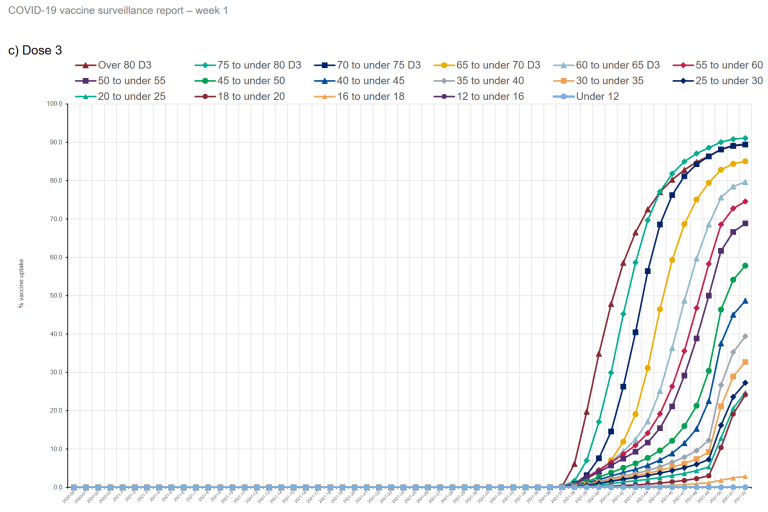
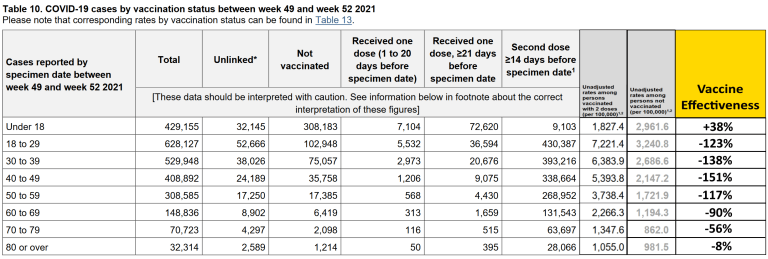
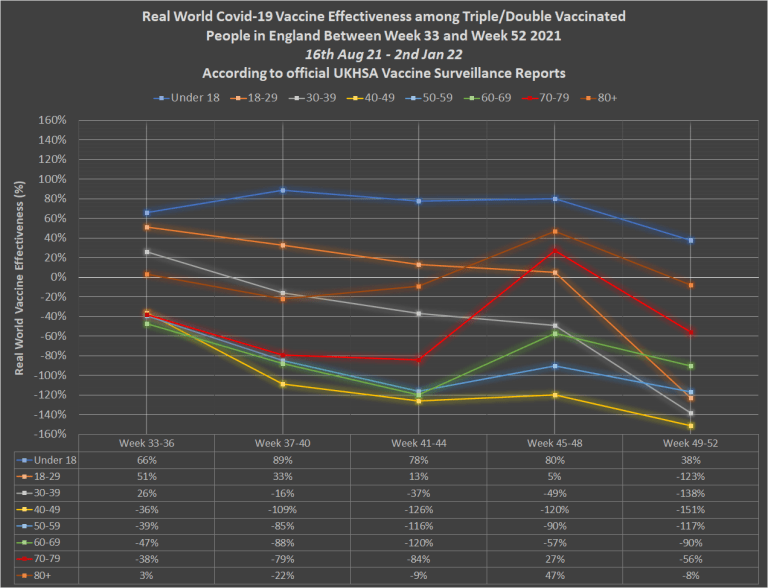
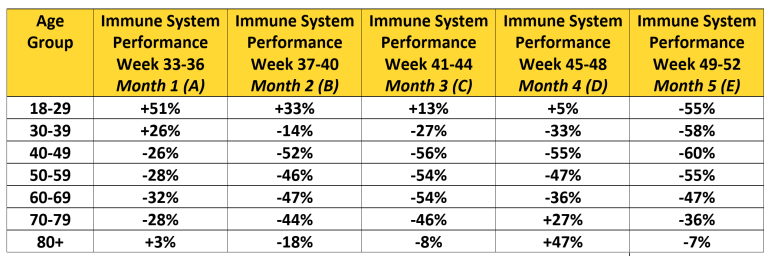
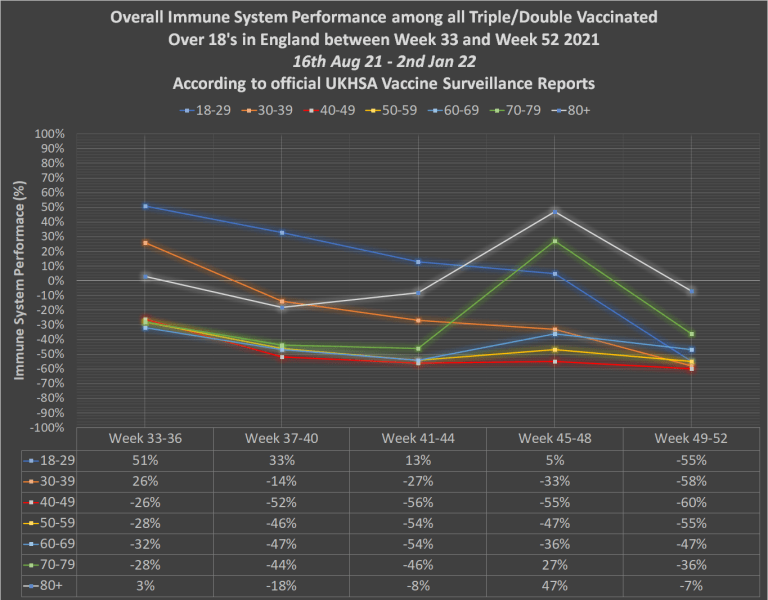
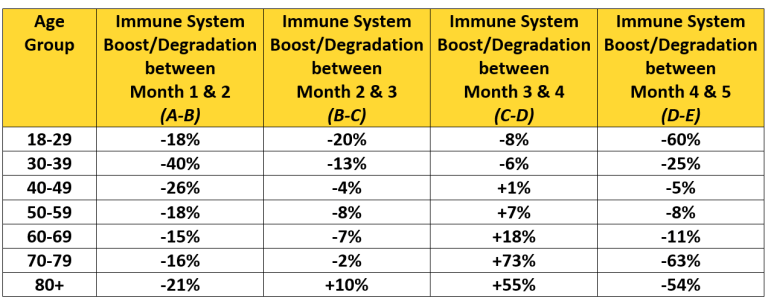
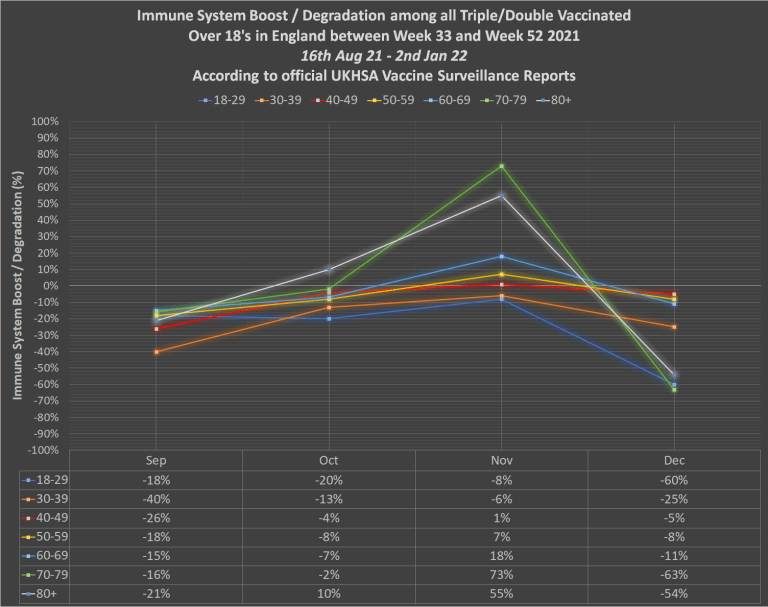



Kommentar: In a previous Exposé article from October 2021 they said: It doesn't appear to have happened to the alarming degree that they initially stated, but there does seem to be a considerable decline in immune function. See also: